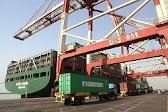He announced the new requirements set by the International
Maritime Organization (IMO) to reduce carbon emissions in the shipping sector
stating, "The policies for developing a maritime-based economy, which
were issued by the Leader in November 2023, have opened new horizons for the
oil industry, maritime transportation, and modern technologies."
He noted that these regulations could be both a threat
and an opportunity, emphasizing, "If we aim to expand international trade,
maritime transportation in compliance with global standards is inevitable. We
believe that through timely action and reliance on engineering and research
capabilities, we can turn this threat into an opportunity."
Iran’s Ports and Maritime Organization (PMO), in a report,
has underlined the importance of the country’s maritime capacities and the role
that the sector can play in developing the country’s economy.
According to the report, maritime sector in Iran has very
high capacity in various fields including trade, ports and shipping due to the
country’s strategic location, long coastal strip in the north and south and
access to open waters, and can bring economic prosperity to the country.
“About a third of the country's borders are water borders,
so we cannot ignore port and shipping activities because for a country that has
long water borders and access to open waters, the prosperity of shipping and
maritime trade is essential. Therefore, the government should pay full
attention to the strengths and weaknesses of this sector and make the best use
of the current capacities with proper planning,” the report read.
Increasing the share of the maritime sector in the country’s
gross domestic product (GDP) under the framework of the newly proposed
maritime-oriented policy should be one of the most important concerns of the
government, which can be achieved with proper planning, the PMO said.
The share of the sea in the gross domestic product in
advanced coastal countries such as the European Union is 50 percent, but the
figure is not significant in Iran despite having more than 5,800 kilometers of
coastal strip, and this is despite the fact that there are huge capacities for
the transit of goods from Central Asian countries.


